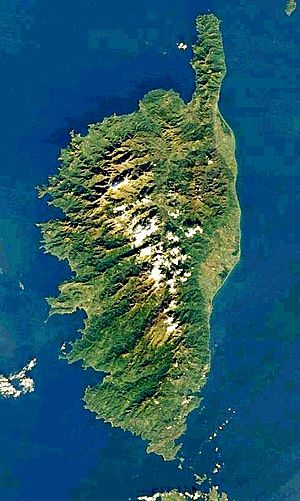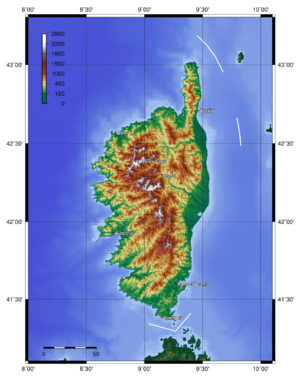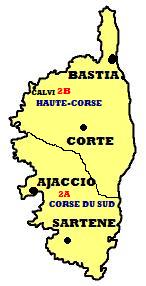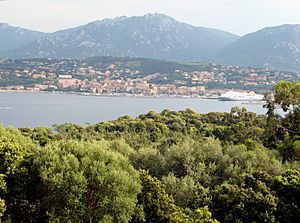Corsica facts for kids
Corsica is a beautiful island located in the Mediterranean Sea. It is the fourth largest island there, after Sicily, Sardinia, and Cyprus. You can find Corsica west of Italy, southeast of France, and just north of the island of Sardinia.
Corsica is a special region of France. It is famous around the world for its stunning places to visit. It is also well-known as the birthplace of Napoléon Bonaparte, a very famous historical figure.
Contents
Geography of Corsica
Corsica has a long coastline, stretching about 1,000 kilometers. It boasts more than 200 amazing beaches. The island is also very mountainous. Its highest point is Monte Cinto, which stands at 2,706 meters tall. There are also 20 other peaks that are more than 2,000 meters high.
Main Towns in Corsica
Here are some of the biggest towns on the island, with their Corsican names:
Other Towns and Villages
You can also find these charming towns and villages:
- Saint-Florent (San Fiurenzu)
- Calvi (Calvi)
- L'Île-Rousse (Isula Rossa)
- Porto-Vecchio (Porti Vechju)
- Bonifacio (Bunifaziu)
- Aleria
Climate and Nature
Corsica is the most mountainous island in the Mediterranean. The lower areas of the island have a typical Mediterranean climate. This means summers are hot and dry. Winters are mild, with some rain. The higher mountain areas are colder and get more rain.
The natural vegetation here includes Mediterranean forests, woodlands, and shrubs. The mountains are full of oak and pine forests, except for the very highest parts. Many coastal lowlands have been cleared for farming. This has reduced the mountain forests quite a bit.
The island has a special natural park called the Parc Naturel Régional de Corse. This park protects thousands of rare animals and plants. It was created in 1972. The park includes the Golfe de Porto and the Réserve Naturelle de Scandola. The Scandola Reserve is so special that it is a UNESCO World Heritage Site. Some of the island's highest mountains are also part of this protected park.
History of Corsica
Corsica has a long and interesting history. Here are some important dates:
- 725: The Lombards settle in Corsica.
- 754: Charlemagne, who was king of the Lombards, gives Corsica to the Pope.
- 1077: Pope Gregory VII gives power over Corsica to an important priest from Pisa.
- 1133: Groups of priests split, some for Genoa and some for Pisa.
- 1195: Soldiers from Genoa arrive in Bonifacio.
- 1268: Soldiers from Genoa arrive in Calvi.
- 1284: Corsica becomes the property of Genoa.
- 1383: The city of Bastia is founded by Genoa.
- 1551: Sampiero Corso fights the Turks for France.
- 1559: The Treaty of Cateau-Cambrésis returns Corsica to Genoa.
- 1725: Pasquale Paoli is born.
- 1730: In December, Corsica declares itself independent.
- 1732: The Peace of Corti is signed.
- 1735: Corsica writes its first constitution.
- 1736: Theodore von Neuhoff becomes the King of Corsica.
- 1737: A meeting happens in Versailles between France and Genoa.
- 1755: On July 14, Pasquale Paoli becomes the "general of the Nation."
- 1755: Corsica writes its second constitution.
- 1765: The University of Corti opens.
- 1768: On May 15, Genoa sells Corsica to the French at the "meeting of Versailles." Corsica fights back against France.
- 1768: On October 9, Pasquale Paoli's soldiers win a battle against the French at "U Borgu."
- 1769: On May 9, Corsica loses the battle of "Ponte Novu" to the French.
- 1769: On June 13, Pasquale Paoli leaves Corsica for Great Britain after his defeat.
- 1769: On August 15, Napoleon Bonaparte is born in Ajaccio.
- 1789: France declares that "Corsica is part of the French kingdom."
- 1790: Corsica becomes a "dipartimentu" (department) of France, with Bastia as its capital.
- 1793: Corsica is split into two parts: "Liamone" and "Golu."
- 1807: Pasquale Paoli dies.
- 1821: Napoleon Bonaparte dies on the island of Saint Helena.
- 1840: Prosper Mérimée travels to Corsica.
- 1858: On August 4, French becomes the official language of Corsica.
How Corsica is Governed
The main city and capital of Corsica is Ajaccio (Corsican: Aiacciu). Corsica is divided into two areas called départements: Corse-du-Sud and Haute-Corse. These two départements were created on September 15, 1975, from the original single département of Corse.
Corsica's Economy
Tourism is the most important part of Corsica's economy. The island has a lovely climate, stunning mountains, and truly beautiful coastlines. This makes it a very popular place for people from France and other parts of Western Europe to visit.
Even though it's popular, Corsica hasn't been developed as much as some other parts of the Mediterranean. Tourism is especially popular around Porto Vecchio and Bonifacio in the south, and Calvi in the northwest of the island.
Politics in Corsica
Corsica is mostly governed like any other region in France. However, there are groups on the island who want Corsica to be fully independent from France. The French government does not support full independence.
Many people on the island do want more control over their own affairs, which is called "autonomy." But most Corsicans, according to polls, do not want complete independence.
In 2000, the Prime Minister Lionel Jospin agreed to give Corsica more autonomy. This plan would have given more protection to the Corsican language (Corsu). Corsu is the island's traditional language, and it is also seen as a dialect of Italian.
However, the plans for more autonomy were opposed by some political groups in the French National Assembly. In a vote on July 6, 2003, a small majority of Corsican voters said no to a government plan. This plan would have removed the two départements and given more autonomy to Corsica.
"U Corsu", the Language of Corsica
In Corsica, the official language is French. But many people also speak "u corsu," which is the traditional language of Corsica. UNESCO helps protect this language.
Corsu is similar to some Italian dialects, especially those from Tuscany. It also shares similarities with the Gallurese language, which is spoken on the nearby island of Sardinia. Corsu has two main types: "Supranacciu," spoken in the northeast (like in Bastia and Corte), and "Suttanacciu," spoken in the south (like in Ajaccio and Sartene). Both Corsu and French come from Latin, the language spoken by the ancient Romans.
Sports in Corsica
Football (soccer) is a very popular sport in Corsica. The island has two teams in France's top league, called 'Ligue 1'. These teams are the AC Ajaccio and the SC Bastia. Another very famous sport in Corsica is volleyball, with the GFCO Ajaccio Volley-Ball team.
Images for kids
-
Corsicans celebrating the birthday of Napoleon.
-
The Bay of Calvi: Corsica is the most mountainous Mediterranean island.
-
Brando in the Haute-Corse department.
-
Port of Ajaccio.
See also
 In Spanish: Córcega para niños
In Spanish: Córcega para niños















